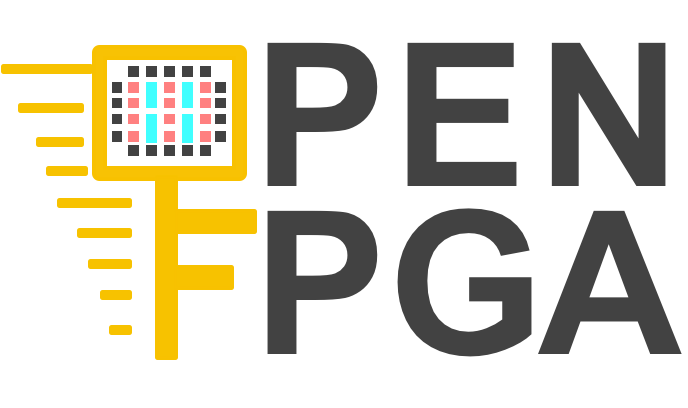Support I/O interfaces for Embedded FPGAs |
||
|---|---|---|
| .github/ISSUE_TEMPLATE | ||
| .travis | ||
| abc | ||
| ace2 | ||
| cmake | ||
| docs | ||
| libopenfpga | ||
| libs | ||
| openfpga | ||
| openfpga_flow | ||
| vpr | ||
| yosys | ||
| .dockerignore | ||
| .gitignore | ||
| .travis.yml | ||
| CMakeLists.txt | ||
| Dockerfile | ||
| LICENSE | ||
| README.md | ||
| deploy_key.enc | ||
| openfpga.sh | ||
| run_local.bat | ||
| run_local.sh | ||
README.md
Getting Started with OpenFPGA 
Introduction
The OpenFPGA framework is the first open-source FPGA IP generator supporting highly-customizable homogeneous FPGA architectures. OpenFPGA provides a full set of EDA support for customized FPGAs, including Verilog-to-bitstream generation and self-testing verification. OpenFPGA opens the door to democratizing FPGA technology and EDA techniques, with agile prototyping approaches and constantly evolving EDA tools for chip designers and researchers.
A quick overview of OpenFPGA tools can be found here. We also recommend potential users to checkout the summary of technical capabilities before compiling.
Compilation
Before start, we strongly recommend you to read the required dependencies at compilation guidelines. It also includes detailed information about docker image.
Compilation Steps:
# Clone the repository and go inside it
git clone https://github.com/LNIS-Projects/OpenFPGA.git && cd OpenFPGA
mkdir build && cd build # Create a folder named build in the OpenPFGA repository
cmake .. # Create a Makefile in this folder using cmake
make # Compile the tool and its dependencies
Quick Compilation Verification
To quickly verify the tool is well compiled, user can run the following command from OpenFPGA root repository.
python3 openfpga_flow/scripts/run_fpga_task.py compilation_verification --debug --show_thread_logs
Python3 and iVerilog v10.1+ are required. GUI will pop-up if enabled during compilation.
Supported Operating Systems
We currently target OpenFPGA for:
- Ubuntu 18.04
- Red Hat 7.5
The tool was tested with these operating systems. It might work with earlier versions and other distributions.
Documentation
OpenFPGA's full documentation includes tutorials, descriptions of the design flow, and tool options.
Tutorials
You can find some tutorials in the ./tutorials folder. This will help you get more familiar with the tool and use OpenFPGA under different configurations.